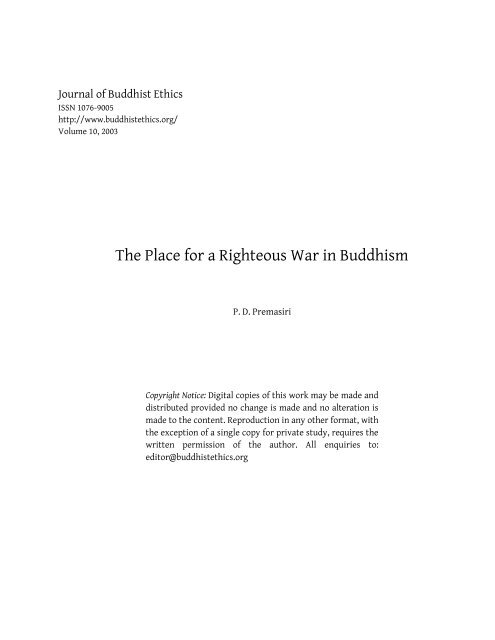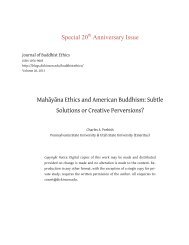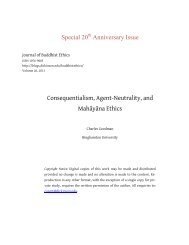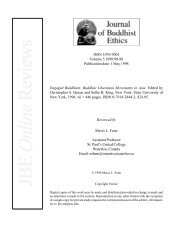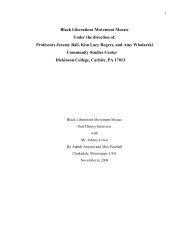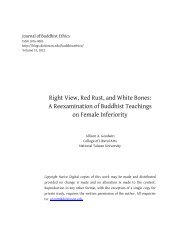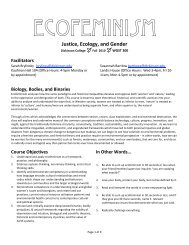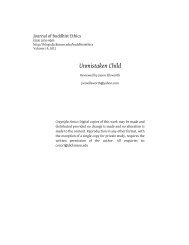The Place for a Righteous War in Buddhism Prof ... - Dickinson Blogs
The Place for a Righteous War in Buddhism Prof ... - Dickinson Blogs
The Place for a Righteous War in Buddhism Prof ... - Dickinson Blogs
You also want an ePaper? Increase the reach of your titles
YUMPU automatically turns print PDFs into web optimized ePapers that Google loves.
Journal of Buddhist Ethics<br />
ISSN 1076-9005<br />
http://www.buddhistethics.org/<br />
Volume 10, 2003<br />
<strong>The</strong> <strong>Place</strong> <strong>for</strong> a <strong>Righteous</strong> <strong>War</strong> <strong>in</strong> <strong>Buddhism</strong><br />
P. D. Premasiri<br />
Copyright Notice: Digital copies of this work may be made and<br />
distributed provided no change is made and no alteration is<br />
made to the content. Reproduction <strong>in</strong> any other <strong>for</strong>mat, with<br />
the exception of a s<strong>in</strong>gle copy <strong>for</strong> private study, requires the<br />
written permission of the author. All enquiries to:<br />
editor@buddhistethics.org
<strong>The</strong> <strong>Place</strong> <strong>for</strong> a <strong>Righteous</strong> <strong>War</strong> <strong>in</strong><br />
<strong>Buddhism</strong><br />
P. D. Premasiri<br />
Sri Lanka has been experienc<strong>in</strong>g the agonies of war <strong>for</strong> almost two<br />
decades result<strong>in</strong>g <strong>in</strong> the death and maim<strong>in</strong>g of thousands of her citizens.<br />
Despite recent moves <strong>for</strong> a peaceful resolution of the conflict, tension<br />
has not eased and the country is not completely free from the dangers of<br />
a resumption of hostilities. <strong>The</strong>re are two major parties to the conflict,<br />
each of which is conv<strong>in</strong>ced about the justifiability of its own cause. Those<br />
who advocate L.T.T.E. militancy are strongly of the op<strong>in</strong>ion that this<br />
organization is fight<strong>in</strong>g a just or righteous war aga<strong>in</strong>st oppression of the<br />
m<strong>in</strong>ority Tamil community by the majority S<strong>in</strong>halese who control the<br />
legislative and executive power of the state. <strong>The</strong>y claim that a separate<br />
state carved out of the present territory of Sri Lanka is the only solution<br />
to their problem, and that s<strong>in</strong>ce this is not possible by peaceful means, it<br />
has to be achieved by means of armed struggle. <strong>The</strong> majority S<strong>in</strong>halese<br />
<strong>in</strong> general claim that Sri Lanka has been one country throughout known<br />
history, and that under no circumstance should the territorial <strong>in</strong>tegrity<br />
of the Sri Lankan state be sacrificed <strong>in</strong> the <strong>in</strong>terests of peace. <strong>The</strong>re is<br />
also a much stronger op<strong>in</strong>ion expressed by those who have been<br />
advocat<strong>in</strong>g the restoration of S<strong>in</strong>hala Buddhist supremacy <strong>in</strong> the country<br />
s<strong>in</strong>ce ga<strong>in</strong><strong>in</strong>g <strong>in</strong>dependence from colonial rule. <strong>The</strong>y contend that Sri<br />
Lanka should not only safeguard her territorial <strong>in</strong>tegrity but also rema<strong>in</strong><br />
as a predom<strong>in</strong>antly S<strong>in</strong>hala Buddhist state. It is the demand <strong>for</strong>
Premasiri, <strong>Righteous</strong> <strong>War</strong> <strong>in</strong> <strong>Buddhism</strong> 154<br />
separation on the one hand and the demand <strong>for</strong> the establishment of<br />
S<strong>in</strong>hala Buddhist supremacy on the other, that seriously h<strong>in</strong>der a<br />
peaceful settlement of the Sri Lankan ethnic conflict.<br />
<strong>The</strong> two ma<strong>in</strong> parties to the conflict also represent people who<br />
<strong>in</strong>herit two of the world's most ancient religious traditions. <strong>Buddhism</strong> is<br />
the religion of a large majority of the S<strong>in</strong>hala community. It is also<br />
evident that the most prom<strong>in</strong>ent among the S<strong>in</strong>hala community who<br />
advocate war as a solution to the problem are lead<strong>in</strong>g people belong<strong>in</strong>g<br />
to the Buddhist lay and monk communities. <strong>The</strong>y perceive the Tamil<br />
militant movement as primarily a threat to the stability and survival of<br />
<strong>Buddhism</strong> <strong>in</strong> Sri Lanka. Sri Lankan historiography has created a dist<strong>in</strong>ct<br />
S<strong>in</strong>hala Buddhist ethnic identity assign<strong>in</strong>g the historical role of the<br />
protection of the Buddha Sasana to the S<strong>in</strong>hala leaders of the lay and<br />
monk communities. <strong>The</strong> majority of the Tamils <strong>in</strong> Sri Lanka are H<strong>in</strong>dus,<br />
but they rarely perceive any religious connection to the present conflict<br />
except that they consider the attitude of the S<strong>in</strong>hala Buddhist lay and<br />
monk perceptions of it as a great h<strong>in</strong>drance to the fulfillment of their<br />
aspirations.<br />
<strong>Buddhism</strong> is a religion well known <strong>for</strong> its teach<strong>in</strong>gs about love<br />
and compassion. <strong>The</strong> ultimate goal of a person tread<strong>in</strong>g the path of<br />
<strong>Buddhism</strong> is the atta<strong>in</strong>ment of perfect <strong>in</strong>ner peace. Whatever the worth<br />
of a desired end may be, the <strong>The</strong>ravada canonical scriptures considered<br />
to be the primary source of the Buddhist system of moral values of the<br />
S<strong>in</strong>hala Buddhist community of Sri Lanka, conta<strong>in</strong> absolutely no <strong>in</strong>stance<br />
<strong>in</strong> which violence is advocated as a means of achiev<strong>in</strong>g it. This is <strong>in</strong> clear<br />
contrast to H<strong>in</strong>du scriptures like the Bhagavadgita that conta<strong>in</strong> a<br />
concept of a righteous war (dharma yuddha). <strong>Buddhism</strong> considers war<br />
and conflict as evil and teaches how an <strong>in</strong>dividual could transcend the<br />
universal tendency to engage <strong>in</strong> conflicts, debates, disputes and wars.<br />
However, <strong>in</strong> the early periods of Sri Lankan history as well as <strong>in</strong> the
155 Journal of Buddhist Ethics<br />
ongo<strong>in</strong>g ethnic conflict, those who profess to be Buddhists do not seem<br />
to have seen any contradiction <strong>in</strong> advocat<strong>in</strong>g war <strong>for</strong> the purpose of<br />
safeguard<strong>in</strong>g <strong>Buddhism</strong>.<br />
Concern<strong>in</strong>g this apparent contradiction the op<strong>in</strong>ion has been<br />
expressed that S<strong>in</strong>hala Buddhist nationalism has trans<strong>for</strong>med the<br />
character of <strong>Buddhism</strong> from be<strong>in</strong>g religion as moral practice to religion<br />
as a cultural and political possession.(1) It is argued that the orig<strong>in</strong>al<br />
soteriological function of <strong>Buddhism</strong> emphasiz<strong>in</strong>g the cultivation of<br />
moral virtues has been replaced by a different social and political<br />
function conceived <strong>in</strong> terms of parochial <strong>in</strong>terests concern<strong>in</strong>g racial and<br />
ethnic identity. Those who see the historical development of <strong>Buddhism</strong><br />
<strong>in</strong> Sri Lanka <strong>in</strong> these terms believe that this trans<strong>for</strong>mation has been a<br />
great contributory factor to the present ethnic conflict. Tambiah<br />
observes that even <strong>in</strong> the case of Buddhist monks "important tenets of<br />
the religion regard<strong>in</strong>g detachment, compassion, tranquility and non-<br />
violence and the overcom<strong>in</strong>g of mental impurities are subord<strong>in</strong>ated and<br />
made less relevant to S<strong>in</strong>hala religio-nationalist and social re<strong>for</strong>m<br />
goals."(2)<br />
As some of those who seek to justify the attitudes connected with<br />
S<strong>in</strong>hala Buddhist nationalism would like to put it, Buddhists are<br />
confronted with two k<strong>in</strong>ds of enemies to battle aga<strong>in</strong>st. <strong>The</strong> first k<strong>in</strong>d is<br />
that Gotama Buddha, the founder of the religion po<strong>in</strong>ted out as the<br />
unskilled mental states, and personified as the armies of death<br />
(marasena). <strong>The</strong> second k<strong>in</strong>d are those external <strong>for</strong>ces that constantly<br />
conspire to destroy <strong>Buddhism</strong> by weaken<strong>in</strong>g the S<strong>in</strong>hala race, recognized<br />
as the very custodians of the religion who preserved <strong>Buddhism</strong> <strong>in</strong> its<br />
prist<strong>in</strong>e purity. <strong>The</strong> present militant movement of the Tamils is<br />
perceived by them as one supported by the enemies of <strong>Buddhism</strong><br />
<strong>in</strong>clud<strong>in</strong>g those of the Western world who desire to attack the Buddhist<br />
heritage of Sri Lanka and to Christianize the S<strong>in</strong>hala people. <strong>The</strong>re<strong>for</strong>e,
Premasiri, <strong>Righteous</strong> <strong>War</strong> <strong>in</strong> <strong>Buddhism</strong> 156<br />
they perceive the war aga<strong>in</strong>st Tamil terrorism as a just, righteous and<br />
necessary one.<br />
This paper will not attempt to come to any conclusions about the<br />
justifiability of the claims of the two contend<strong>in</strong>g parties. Its objective is<br />
to go back to the canonical Buddhist sources and to exam<strong>in</strong>e whether<br />
the normative pr<strong>in</strong>ciples of canonical <strong>Buddhism</strong> can be <strong>in</strong>voked <strong>in</strong><br />
favour of a righteous war <strong>in</strong>volv<strong>in</strong>g the protection of <strong>Buddhism</strong>. An<br />
attempt will be made to present as far as possible all the material<br />
relevant to the issue. When all the material is presented one might f<strong>in</strong>d<br />
that it is not surpris<strong>in</strong>g that people who profess to be Buddhists also<br />
advocate war and directly participate <strong>in</strong> war. It is not a new<br />
phenomenon but one that <strong>Buddhism</strong> implicitly recognized as a<br />
possibility even dur<strong>in</strong>g the canonical period.<br />
<strong>The</strong>re is no doubt that the ultimate goal of <strong>Buddhism</strong> is to<br />
overcome conflict primarily at the level of <strong>in</strong>dividual consciousness. This<br />
is evident from the answer that the Buddha had given to a person who<br />
questioned him about the doctr<strong>in</strong>e he propounded. <strong>The</strong> doctr<strong>in</strong>e of the<br />
Buddha is such that one who lives <strong>in</strong> accordance with it succeeds <strong>in</strong><br />
liv<strong>in</strong>g <strong>in</strong> the world without com<strong>in</strong>g <strong>in</strong>to conflict with anyone (na kenaci<br />
loke viggayha titthati).(3) <strong>The</strong> Buddhist path of moral development is<br />
described as the noble and <strong>in</strong>comparable path of peace (anuttaram<br />
santivarapadam). <strong>The</strong> requirements of the Buddhist path are considered<br />
to be fulfilled when one's m<strong>in</strong>d atta<strong>in</strong>s perfect peace (santim pappuyya<br />
cetaso). Nibbana, the utimate atta<strong>in</strong>ment can be described as the<br />
atta<strong>in</strong>ment of <strong>in</strong>ner peace (ajjhanta santi).<br />
Accord<strong>in</strong>g to <strong>Buddhism</strong>, the <strong>for</strong>emost truth about the human<br />
condition is the existence of dukkha. <strong>The</strong> term dukkha connotes all<br />
disappo<strong>in</strong>tments, frustrations, discontents, unhapp<strong>in</strong>ess as well as the<br />
unsatisfactory state of affairs characteristic of the world of mental and<br />
physical nature. <strong>The</strong> persistence of dukkha <strong>in</strong> all its different <strong>for</strong>ms is
157 Journal of Buddhist Ethics<br />
dependent on the activity of unwholesome mental processes referred to<br />
<strong>in</strong> <strong>Buddhism</strong> as asava (<strong>in</strong>fluxes), anusaya (latent evil) and kilesa<br />
(psychological defilements). All <strong>in</strong>ner psychological conflicts as well as<br />
conflicts produced <strong>in</strong> society are traced <strong>in</strong> <strong>Buddhism</strong> to these<br />
psychological causes. All wars, accord<strong>in</strong>g to the Buddhist view, orig<strong>in</strong>ate<br />
<strong>in</strong> the m<strong>in</strong>ds of people. <strong>The</strong> behaviour of the large majority of liv<strong>in</strong>g<br />
be<strong>in</strong>gs is determ<strong>in</strong>ed by the mental processes referred to <strong>in</strong> <strong>Buddhism</strong> as<br />
unskilled or unwholesome (akusala). Conflict <strong>in</strong> society is there<strong>for</strong>e,<br />
considered <strong>in</strong> <strong>Buddhism</strong> to be endemic. <strong>The</strong> Sakkapanha Sutta draws<br />
attention to this as follows:<br />
Devas, men, Asuras, Nagas, Gandhabbas and whatever other<br />
different k<strong>in</strong>ds of communities are there, it occurs to them that<br />
they ought to live without mutual hatred, violence, enmity and<br />
malice. Yet <strong>for</strong> all they live with mutual hatred, violence and<br />
malice.(4)<br />
<strong>The</strong> <strong>in</strong>tensity of the miseries produced when conflicts arise <strong>in</strong> human<br />
society is described <strong>in</strong> the Mahadukkhakkhandha Sutta as follows:<br />
Hav<strong>in</strong>g taken swords and shield, hav<strong>in</strong>g girded on bow and<br />
quiver, both sides mass <strong>for</strong> battle and arrows are hurled and<br />
knives are hurled and swords are flash<strong>in</strong>g. Those who wound<br />
with arrows and wound with knives and decapitate with their<br />
swords, these suffer dy<strong>in</strong>g then and pa<strong>in</strong>s like unto dy<strong>in</strong>g.(5)<br />
In several contexts <strong>in</strong>clud<strong>in</strong>g the above the Buddha expla<strong>in</strong>s the<br />
psychological orig<strong>in</strong>s of such conflict.(6) Conflict is expla<strong>in</strong>ed <strong>in</strong> these<br />
<strong>in</strong>stances as a consequence of an unenlightened response to one's<br />
sensory environment. As long as people lack an <strong>in</strong>sightful understand<strong>in</strong>g<br />
of the mechanical nature of the reactions to the sensory environment<br />
produced by unwholesome roots of psychological motivation conflict <strong>in</strong><br />
society cannot be avoided. <strong>Buddhism</strong> traces conflict <strong>in</strong> society to certa<strong>in</strong>
Premasiri, <strong>Righteous</strong> <strong>War</strong> <strong>in</strong> <strong>Buddhism</strong> 158<br />
<strong>in</strong>st<strong>in</strong>ctual responses of people such as the attraction to what is pleasant,<br />
the repulsion aga<strong>in</strong>st what is unpleasant, the pursuit of what gives<br />
pleasure, the psychological friction aga<strong>in</strong>st what produces displeasure,<br />
the great desire to protect one's own possessions, the irritable feel<strong>in</strong>g<br />
experienced when other persons enjoy possessions that one is <strong>in</strong>capable<br />
of acquir<strong>in</strong>g, compet<strong>in</strong>g claims on limited resources, ideological<br />
disagreements <strong>in</strong>volv<strong>in</strong>g dogmatic cl<strong>in</strong>g<strong>in</strong>g to one's own view and so on.<br />
<strong>The</strong> selfish pursuit of sense pleasures (kama) is considered as the root<br />
cause of conflict. Where there is sympathetic concern, compassion,<br />
shar<strong>in</strong>g, charitableness and generosity conflict can be m<strong>in</strong>imized. <strong>The</strong><br />
latter attitudes, however, are not <strong>in</strong>st<strong>in</strong>ctive. <strong>The</strong>y need to be cultivated<br />
through proper reflection and <strong>in</strong>sightful understand<strong>in</strong>g.<br />
It is evident that <strong>in</strong> <strong>in</strong>stances such as the above where <strong>Buddhism</strong><br />
refers to conflicts, their source as well as their consequence is<br />
considered to be evil and undesirable. <strong>The</strong> unwholesome impulses that<br />
generate conflict as well as the unwholesome psychological states and<br />
patterns of behaviour that grow and become manifest <strong>in</strong> situations of<br />
violent conflict negate righteousness. It would, there<strong>for</strong>e, imply that<br />
there cannot be a righteous war from the Buddhist po<strong>in</strong>t of view.<br />
<strong>The</strong> only <strong>in</strong>stance <strong>in</strong> which Buddhist canonical sources speak of<br />
victory or conquest through righteousness is where reference is made to<br />
the political pr<strong>in</strong>ciples of a cakkavatti who conquers territory not with<br />
the <strong>for</strong>ce of arms but through pr<strong>in</strong>ciples of morality. <strong>The</strong> idea of a just or<br />
righteous war (dharma yuddha) <strong>in</strong>volv<strong>in</strong>g the use of weapons of war and<br />
violence is conspicuously absent <strong>in</strong> the Buddhist canon. <strong>The</strong> Buddha<br />
countered the prevail<strong>in</strong>g belief that soldiers of war who fight <strong>for</strong> a cause<br />
could, as a consequence of their rightful per<strong>for</strong>mance of duty, aspire to<br />
atta<strong>in</strong> a heavenly rebirth if they succumb to their <strong>in</strong>juries while <strong>in</strong><br />
combat. Accord<strong>in</strong>g to the Buddha one who fights a war does not<br />
generate wholesome thoughts but thoughts of malice and hatred, which
159 Journal of Buddhist Ethics<br />
are absolutely unwholesome.(7) <strong>The</strong>re<strong>for</strong>e, their future dest<strong>in</strong>y will be a<br />
woeful one, which is <strong>in</strong> accordance with their unwholesome kamma.<br />
<strong>The</strong> Atthakavagga of the Suttanipata speaks of conflicts, debates<br />
and disputes prevalent among people who pursued the religious life,<br />
dogmatically cl<strong>in</strong>g<strong>in</strong>g to mutually contradictory op<strong>in</strong>ions or theories on<br />
the nature of the good life. Although the context <strong>in</strong> which such disputes<br />
are mentioned did not <strong>in</strong>volve any armed combat, the Buddhist analysis<br />
of the psychological conditions that determ<strong>in</strong>ed them can be seen to be<br />
applicable to all situations <strong>in</strong> which disputes arise. <strong>The</strong> Buddha's<br />
observations on the psychological and behavioural processes that<br />
operate <strong>in</strong> situations of conflict are very relevant to <strong>in</strong>stances <strong>in</strong> which<br />
people argue <strong>in</strong> favour of righteous wars. <strong>The</strong>re is no doubt that <strong>in</strong> the<br />
modern civilized world, war or aggression motivated by imperialist and<br />
expansionist <strong>in</strong>tentions is subjected to universal condemnation.<br />
Similarly deprivation of human rights and oppression of the weak by the<br />
strong is also widely open to moral condemnation. However, it is to be<br />
noted that attempts are made by each party that is currently engaged <strong>in</strong><br />
war to show that violence is the only alternative available to achieve<br />
what is perceived by each as the righteous cause. <strong>The</strong> po<strong>in</strong>t made by the<br />
Buddha <strong>in</strong> this connection is that people are psychologically <strong>in</strong>capable of<br />
<strong>for</strong>m<strong>in</strong>g op<strong>in</strong>ions about what is right and wrong, just and unjust,<br />
righteous and unrighteous while be<strong>in</strong>g immersed <strong>in</strong> their defiled<br />
psychological condition. <strong>The</strong>y may express strong convictions about<br />
what is just and right, but when objectively exam<strong>in</strong>ed they turn out to be<br />
mere rationalizations of their pre-conceived notions, desires, crav<strong>in</strong>gs,<br />
likes and dislikes. When the unwholesome roots of motivation are<br />
removed conflicts and disputes no longer arise. When people make<br />
decisions about what is right and wrong, just and unjust while they are<br />
still affected by the roots of evil, greed, hatred and delusion their<br />
judgements are mere rationalizations. What we may conclude from this<br />
is that <strong>Buddhism</strong> allows no place <strong>for</strong> righteous wars.
Premasiri, <strong>Righteous</strong> <strong>War</strong> <strong>in</strong> <strong>Buddhism</strong> 160<br />
<strong>The</strong> Buddhist canonical standpo<strong>in</strong>t elucidated above shows<br />
clearly that the psychology of war is antithetical to the psychology of<br />
Buddhist liberation. Liberation is ensured only by the elim<strong>in</strong>ation of<br />
greed, hatred and delusion. <strong>War</strong>, whatever <strong>for</strong>m it takes, is produced by<br />
greed, hatred and delusion and other ramifications of these basic roots<br />
of unwholesome behaviour. This would imply that if every Buddhist<br />
pursued the Buddhist goal of liberation there should be no wars <strong>in</strong><br />
Buddhist communities. But can we reasonably expect this to happen?<br />
<strong>The</strong> Pali canon itself bears evidence that even the Buddha did not expect<br />
it to happen. It would be totally unrealistic to enterta<strong>in</strong> such an<br />
expectation.<br />
A Buddhist community, like any other one consists of people of<br />
different degrees of moral development. Ord<strong>in</strong>ary lay Buddhists are<br />
referred to as persons who enjoy the pleasures of sense (kamabhog<strong>in</strong>o).<br />
Here we should note that the pursuit of k(ma (sense pleasures) is seen <strong>in</strong><br />
<strong>Buddhism</strong> as the most proximate psychological cause of conflict.<br />
Disputes arise even between members of the same family, of the same<br />
caste, race or social group, between nations etc. due to the pursuit of<br />
kama. People who are engaged <strong>in</strong> this pursuit are not liberated be<strong>in</strong>gs <strong>in</strong><br />
the Buddhist sense, <strong>for</strong>, they are not free from the roots of evil, greed or<br />
lust, hatred and delusion. <strong>The</strong> Mahanidana Sutta describes, <strong>in</strong> terms of<br />
the Buddhist doctr<strong>in</strong>e of dependent orig<strong>in</strong>ation, how people are driven<br />
to conflicts as a result of seek<strong>in</strong>g to secure their cherished possessions.<br />
People are strongly attached to their material possessions, their cultural<br />
traditions, their belief systems, their values, etc. If they perceive a threat<br />
to any of these th<strong>in</strong>gs to which they are attached the natural tendency is<br />
to be drawn <strong>in</strong>to conflict. This is why <strong>Buddhism</strong> considers conflict as an<br />
unavoidable evil <strong>in</strong> society. Even the Cakkavatti ruler conceived <strong>in</strong><br />
<strong>Buddhism</strong> as one who rules accord<strong>in</strong>g to the pr<strong>in</strong>ciples of justice does<br />
not disband his armies. For, he too had secular duties to per<strong>for</strong>m as the<br />
guardian of his citizens. This shows that <strong>Buddhism</strong> does not envisage a
161 Journal of Buddhist Ethics<br />
society <strong>in</strong> which the necessity <strong>for</strong> engag<strong>in</strong>g <strong>in</strong> war never arises. Perhaps<br />
the implication is that even a righteous Cakkavatti who will not engage<br />
<strong>in</strong> wars of imperialist aggression, would need to fight <strong>in</strong> self-defense.<br />
In Buddhist canonical mythology there is reference to two types<br />
of celestial be<strong>in</strong>gs, one represent<strong>in</strong>g the righteous, the devas, and the<br />
other represent<strong>in</strong>g the unrighteous, the asuras. <strong>The</strong> two groups are<br />
mentioned as engag<strong>in</strong>g <strong>in</strong> war from time to time. <strong>The</strong> battlefront of the<br />
devas aga<strong>in</strong>st the evil asuras was led by Sakka, the most devout Buddhist<br />
god. Sometimes Sakka is represented as order<strong>in</strong>g the leaders of his<br />
armies like Suvira and Susima to act vigilantly and effectively aga<strong>in</strong>st the<br />
aggressive enemy <strong>for</strong>ces. However, <strong>in</strong> such <strong>in</strong>stances Sakka concedes the<br />
fact that the Buddhist goal of Nibbana is of much greater worth than the<br />
victory over a mundane conflict.(8) Sakka himself, advices the<br />
combatants on his side that when they are overcome with fear <strong>in</strong> the<br />
battlefield, confronted by the advanc<strong>in</strong>g enemy <strong>for</strong>ces, they should take<br />
courage by look<strong>in</strong>g towards the might and glory of Sakka or that of any<br />
of the other powerful gods <strong>in</strong> order to be rid of their fear. <strong>The</strong> Buddha<br />
says that by this means they will not always be rid of their fear because<br />
neither Sakka nor any of the other gods, is free from lust, hatred and<br />
delusion. <strong>The</strong>y can all be overcome by fear and flee <strong>in</strong> the face of a threat<br />
to their lives. <strong>The</strong> Buddha says that his bhikkhu disciples who may be<br />
overcome by fear when they battle aga<strong>in</strong>st the <strong>in</strong>ner foes of the m<strong>in</strong>d<br />
meditat<strong>in</strong>g <strong>in</strong> desolate places may look towards the Buddha to be rid of<br />
their fear. In this case they would <strong>in</strong>deed succeed, <strong>for</strong> the Buddha is free<br />
from lust, hatred and delusion and there<strong>for</strong>e would not be overcome by<br />
fear, or flee <strong>in</strong> the face of danger.(9) In another <strong>in</strong>stance Sakka speaks to<br />
the Buddha about the joy and happ<strong>in</strong>ess he experienced by becom<strong>in</strong>g<br />
victorious over asuras after engag<strong>in</strong>g them <strong>in</strong> war. But Sakka says that<br />
the joy he experienced then was associated with the victory obta<strong>in</strong>ed<br />
from violent armed conflict and there<strong>for</strong>e did not conduce to the<br />
Buddhist goal of liberation. He contrasts that joy with the joy, which is
Premasiri, <strong>Righteous</strong> <strong>War</strong> <strong>in</strong> <strong>Buddhism</strong> 162<br />
free from any associations with violence that he experienced after<br />
listen<strong>in</strong>g to the good teach<strong>in</strong>g of the Buddha. That he says, is joy that<br />
leads to disenchantment with all worldly th<strong>in</strong>gs and to the ultimate<br />
peace of Nibbana.(10) In these <strong>in</strong>stances it is implied that armed conflict<br />
is not compatible with any serious commitment to the Buddhist goal of<br />
liberation, but may on occasion be unavoidable <strong>in</strong> the case of people<br />
deal<strong>in</strong>g with mundane affairs. Even the pious Buddhist god Sakka, as a<br />
participant <strong>in</strong> mundane affairs, was no exception to this.<br />
<strong>The</strong> po<strong>in</strong>ts highlighted <strong>in</strong> the above discussion should not be<br />
taken as imply<strong>in</strong>g that <strong>Buddhism</strong> places no moral restrictions on people<br />
who are concerned with mundane affairs <strong>in</strong> go<strong>in</strong>g to war. <strong>War</strong> <strong>in</strong>volves<br />
violent behaviour on the part of those who directly participate <strong>in</strong> it, and<br />
violence proceeds from malice and hatred whether it is motivated by the<br />
desire to achieve what is conceived as a just cause or not. <strong>The</strong>re<strong>for</strong>e the<br />
canonical teach<strong>in</strong>gs often emphasize the importance of conciliatory<br />
methods of resolv<strong>in</strong>g conflicts be<strong>for</strong>e embark<strong>in</strong>g on war. <strong>The</strong> ethical<br />
teach<strong>in</strong>gs of the Dhammapada ma<strong>in</strong>ta<strong>in</strong> that hatred can never be<br />
appeased by hatred and that it can only be appeased by non-hatred.(11)<br />
Anger ought to be won over by non-anger, and miserl<strong>in</strong>ess by<br />
generosity.(12) Forbearance and non-<strong>in</strong>jury are considered as card<strong>in</strong>al<br />
virtues of rulers. <strong>The</strong> Buddha himself had <strong>in</strong>tervened <strong>in</strong> situations where<br />
people had thought of resolv<strong>in</strong>g their problems through war, and<br />
persuaded them to resort to peaceful and conciliatory methods of<br />
resolv<strong>in</strong>g conflicts, draw<strong>in</strong>g their attention to the <strong>in</strong>tr<strong>in</strong>sic worth of<br />
human lives.(13) From the Buddhist po<strong>in</strong>t of view, most wars are a<br />
consequence of the collectivized emotions rul<strong>in</strong>g over a sound sense of<br />
judgement. <strong>The</strong> teach<strong>in</strong>gs of the Buddha conta<strong>in</strong> immensely valuable<br />
pr<strong>in</strong>ciples that can be applied <strong>for</strong> the purpose of educat<strong>in</strong>g people <strong>for</strong><br />
peace. Attention has already been drawn to the role of unwholesome<br />
emotions, the various obsessions, prejudices, psychological complexes<br />
and pre-conceived notions that <strong>in</strong>fluence people's judgements.
163 Journal of Buddhist Ethics<br />
Collective delusion and ignorance often play havoc <strong>in</strong> society. A great<br />
deal of human suffer<strong>in</strong>g is produced as a consequence of improper<br />
reflection (ayoniso manasikara). If some of the pr<strong>in</strong>ciples of proper<br />
reflection (yoniso manasikara) <strong>in</strong>troduced <strong>in</strong> the Buddhist teach<strong>in</strong>gs are<br />
clearly identified and really applied <strong>in</strong> social th<strong>in</strong>k<strong>in</strong>g and behaviour, it<br />
might be possible to reduce the tendency to seek to resolve<br />
disagreements through violence.<br />
Be<strong>for</strong>e this discussion is concluded it seems appropriate to<br />
mention one last po<strong>in</strong>t about the Buddhist canonical accounts relat<strong>in</strong>g to<br />
war. Where one of the parties engaged <strong>in</strong> war is considered as righteous<br />
and the other as unrighteous, the Buddhist canonical accounts highlight<br />
the ethical qualities of the righteous party by show<strong>in</strong>g that although<br />
they are compelled by circumstances to engage <strong>in</strong> war <strong>for</strong> the purpose of<br />
self-defense, they do not resort to unnecessary acts of cruelty even<br />
towards the defeated. <strong>The</strong> righteous party <strong>in</strong> war avoids harm to the<br />
<strong>in</strong>nocent and is ready to pardon even the defeated enemy. Skillful<br />
methods are adopted <strong>in</strong> order to cause the least harm. Where the enemy<br />
could be defeated without <strong>in</strong>jury to and destruction of life those skillful<br />
means to do so are explored to the maximum.(14) An example of this<br />
aspect of the ethics of war is found <strong>in</strong> Buddhist mythology where the<br />
wars between the righteous Devas and the unrighteous Asuras are<br />
mentioned. Accord<strong>in</strong>g to one story, on one occasion the Devas were<br />
defeated by the Asuras and they had to flee from the battleground <strong>for</strong><br />
the protection of their lives.(15) As they were tak<strong>in</strong>g to flight <strong>for</strong> fear of<br />
the enemy they had to cross the Simbali <strong>for</strong>est. As the armies crossed the<br />
<strong>for</strong>est a large number of nests of Supannas built on tree tops were <strong>in</strong><br />
danger of be<strong>in</strong>g broken and fall<strong>in</strong>g <strong>in</strong>to the ocean as the tree tops were<br />
gett<strong>in</strong>g crushed by the flee<strong>in</strong>g armies of the Devas.(16) It is said that the<br />
armies headed by Sakka, turned back through fear of harm<strong>in</strong>g <strong>in</strong>nocent<br />
be<strong>in</strong>gs not car<strong>in</strong>g <strong>for</strong> the risk they were fac<strong>in</strong>g due to the pursu<strong>in</strong>g<br />
armies of the Asuras. In another mythical story, the Devas become
Premasiri, <strong>Righteous</strong> <strong>War</strong> <strong>in</strong> <strong>Buddhism</strong> 164<br />
victorious over the Asuras and the k<strong>in</strong>g of the Asuras, Vepacitti was<br />
taken prisoner and was brought to the territory of the Devas, driven <strong>in</strong><br />
Sakka's chariot by his charioteer Matali, Vepacitti's limbs all bound with<br />
cha<strong>in</strong>s. Vepacitti turned to be extremely abusive us<strong>in</strong>g harsh words<br />
aga<strong>in</strong>st Sakka, the k<strong>in</strong>g of the Devas. Sakka, however, did not retort, and<br />
the driver of Sakka's chariot was curious to know whether Sakka's<br />
behaviour was due to fear or to weakness. Sakka responds say<strong>in</strong>g that he<br />
is not so stupid as to retort to a foolish person like Vepacitti. Endurance<br />
of the abuses of a foolish person, accord<strong>in</strong>g to Sakka, is a greater<br />
strength than retaliation. <strong>The</strong> last l<strong>in</strong>e of the verses where this canonical<br />
myth is <strong>in</strong>troduced says "the person who does not express anger <strong>in</strong><br />
return <strong>for</strong> one who expresses anger w<strong>in</strong>s a war which is difficult to w<strong>in</strong>"<br />
(kuddham appatikujjhanto sangamam jayati dujjayam).(17) While<br />
mention<strong>in</strong>g <strong>in</strong>stances <strong>in</strong> which even the righteous are compelled to fight<br />
wars, <strong>Buddhism</strong> shows the strik<strong>in</strong>g difference between the behaviour of<br />
the righteous and the unrighteous even when they are warr<strong>in</strong>g parties.<br />
<strong>The</strong> canonical teach<strong>in</strong>gs also draw attention to the fact that <strong>in</strong> war,<br />
victory br<strong>in</strong>gs <strong>for</strong>th hatred (jayam veram pasavati); the defeated lie <strong>in</strong><br />
grief (dukkham seti parajito); the one who is calm or of pacified m<strong>in</strong>d<br />
puts aside both victory and defeat and lies <strong>in</strong> com<strong>for</strong>t (upasanto sukham<br />
seti hitva jayaparajayam).(18)<br />
In summ<strong>in</strong>g up the <strong>in</strong>quiry <strong>in</strong>to the question whether there can<br />
be any reasons <strong>in</strong> favour of a righteous war accord<strong>in</strong>g to the canonical<br />
teach<strong>in</strong>gs of <strong>Buddhism</strong>, it should be reiterated that war, accord<strong>in</strong>g to<br />
<strong>Buddhism</strong> is necessarily evil. Anyone who engages <strong>in</strong> it is compelled to<br />
commit acts of violence at least aga<strong>in</strong>st the enemy who needs to be<br />
subdued. Participation <strong>in</strong> any k<strong>in</strong>d of violence is absolutely out of the<br />
question <strong>for</strong> those who seriously pursue the goal of Nibbana. <strong>The</strong>ir only<br />
option is to w<strong>in</strong> over those who are cruel and violent through k<strong>in</strong>dness<br />
and compassion. <strong>War</strong>s and conflicts are endemic <strong>in</strong> society, due to the<br />
strong tendency of people to protect their own possessions with
165 Journal of Buddhist Ethics<br />
miserl<strong>in</strong>ess (macchariya) and due to the jealousy that affects people who<br />
are deprived of certa<strong>in</strong> possessions enjoyed by others. More often than<br />
not, attempts to justify violence could be mere rationalizations of self<br />
<strong>in</strong>terest. <strong>Buddhism</strong> grants that the large majority of people who are<br />
engaged <strong>in</strong> mundane affairs, although they may be devout Buddhists,<br />
and may be to a high degree righteous people, (as exemplified by the<br />
mythological stories of Devas headed by Sakka go<strong>in</strong>g to war with Asuras)<br />
are sometimes compelled to fight wars. <strong>The</strong> Buddhist teach<strong>in</strong>gs, by<br />
means of mythological tales and story tell<strong>in</strong>g homilies attempt to<br />
<strong>in</strong>troduce a sense of morality and a concern <strong>for</strong> justice and fair play even<br />
<strong>in</strong> situations where people are compelled to fight wars. Reflection on the<br />
Buddhist canonical teach<strong>in</strong>gs outl<strong>in</strong>ed above by all Sri Lankans who<br />
cherish Buddhist moral values could be useful and important <strong>in</strong> the<br />
context of the current conflict.<br />
Notes<br />
(1) S.J. Tambiah, <strong>Buddhism</strong> Betrayed? (University of Chicago Press, 1992),<br />
p. 59.2 Return to text.<br />
(2) Ibid. Return to text.<br />
(3) Majjhimanikaya (Pali Text Society, London), vol. 1, p. 109. Return to<br />
text.<br />
(4) Dighanikaya (PTS) Vol. II, p. 276. Return to text.<br />
(5) Majjhimanikaya (PTS) Vol. I, p.86, translated by I.B. Horner, Middle<br />
Length Say<strong>in</strong>gs, (Pali Text Society London, 1954), Vol. I, p. 114. Return to<br />
text.<br />
(6) Kalahavivada, Madhup<strong>in</strong>dika and Mahanidana Suttas. Return to text.<br />
(7) Samyuttanikaya (PTS) Vol. 4, p. 308. Return to text.<br />
(8) Ibid. Vol. 1, p. 216. Return to text.
Premasiri, <strong>Righteous</strong> <strong>War</strong> <strong>in</strong> <strong>Buddhism</strong> 166<br />
(9) Ibid. Return to text.<br />
(10) Dighanikaya (PTS) Vol. 2, p. 285. Return to text.<br />
(11) Dhammapada, verse 5. Return to text.<br />
(12) Ibid. verse 223 Return to text.<br />
(13) Jataka (PTS) Vol. 5, pp. 412ff. Return to text.<br />
(14) See Ummagga Jataka, Jataka 4, p.329 ff. Return to text.<br />
(15) Samyuttanikaya vol. 1, p.224; Jataka no. 31. Return to text.<br />
(16) Supannas are a class of mythical birds mentioned <strong>in</strong> Buddhist<br />
mythological literature. Return to text.<br />
(17) Samyuttanikaya 1, pp. 221-222. Return to text.<br />
(18) Ibid. p. 83. Return to text.<br />
Copyright 2003


